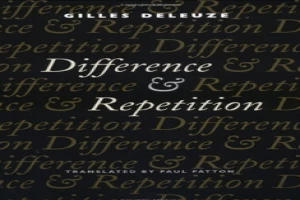Newly released
This book is new and will be uploaded as soon as it becomes available to us and if we secure the necessary publishing rights.

Difference and repetition
(0)
Author:
Gilles DeleuzeNumber Of Reads:
252
Language:
English
Category:
Social sciencesSection:
Pages:
187
Quality:
good
Views:
2425
Quate
Review
Save
Share
New
Book Description
This brilliant exposition of the critique of identity is a classic in contemporary philosophy and one of Deleuze's most important works. Of fundamental importance to literary critics and philosophers,Difference and Repetition develops two central concepts--pure difference and complex repetition--and shows how the two concepts are related. While difference implies divergence and decentering, repetition is associated with displacement and disguising. Central in initiating the shift in French thought away from Hegel and Marx toward Nietzsche and Freud, Difference and Repetition moves deftly to establish a fundamental critique of Western metaphysics.
Gilles Deleuze
Gilles Deleuze (French Gilles Deleuze) (18 January 1925 – 4 November 1995) was a French philosopher who wrote on philosophy, literature, film, and the fine arts from the early 1950s until his death in 1995. Plateau 1980, co-writing both with psychoanalyst Felix Guattari. His metaphysical treatise Difference and Repetition (1968) is considered by many scholars to be one of his greatest creations. Philosopher Adrian William Moore ranks him among the "greatest philosophers", citing Bernard Williams' criteria for a great thinker. Although he has described himself in the past as "pure metaphysics," his work has influenced a variety of disciplines across philosophy and art, including literary theory, post-structuralism, and postmodernism.
Gilles Deleuze, along with many Marxist-inspired neo-Spinosists such as Louis Althusser, Étienne Balibar, and Antonio Negri, was one of the key figures in the great flowering of Spinoza studies in continental philosophy in the late twentieth and early twenty-first centuries (or the rise of French Spinoism post-structuralist-inspired), which was Spinoza's second revival in history, after Neo-Spinozism of great importance in German philosophy and literature in about the late eighteenth and early nineteenth centuries. Deleuze's preoccupation with and reverence for Spinoza is well known in contemporary philosophy. As Pierre Macherry stated, “An important part of Deleuze's work is devoted to reading philosophers: Stokes, Leibniz, Hume, Kant, Nietzsche, Bergson, etc. But an individual position on this list will be assigned to Spinoza, because of the philosophical interest with which he corresponds.
Read More
Book Currently Unavailable
This book is currently unavailable for publication. We obtained it under a Creative Commons license, but the author or publisher has not granted permission to publish it.
Rate Now
5 Stars
4 Stars
3 Stars
2 Stars
1 Stars
Quotes
Top Rated
Latest
Quate
Be the first to leave a quote and earn 10 points
instead of 3
Comments
Be the first to leave a comment and earn 5 points
instead of 3